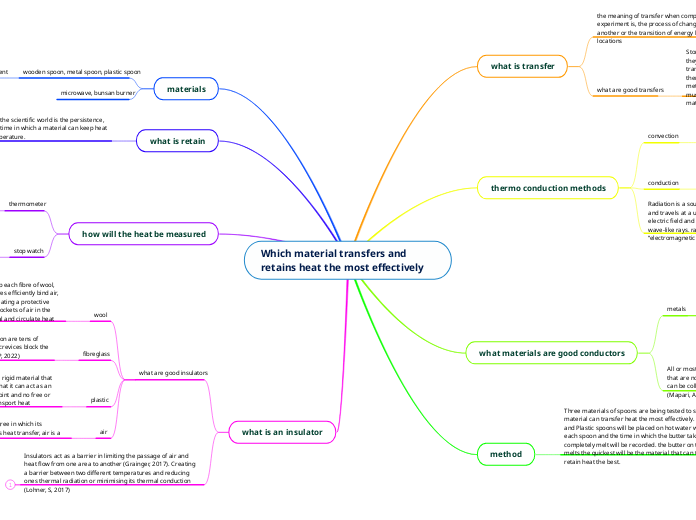Which material transfers and retains heat the most effectively
what is transfer
the meaning of transfer when completing an= scientific experiment is, the process of changing one type of energy into another or the transition of energy between two different locations
what are good transfers
Stone and metals are considered as good conductors because they quickly transfer heat. Because of the efficient energy transfer provided by their delocalised electrons, they are good thermal energy conductors. Due to the extremely strong metallic bonding found in a metal's massive structure, which must be broken in order for melting and boiling to occur, these materials have high melting and boiling temperatures.
thermo conduction methods
convection
Convection, often known as a heat transfer mechanism, is a method of moving heat. When a fluid, such as air or water, is moving, this heat transfer takes place.
conduction
When neighboring atoms or molecules collide during the heating process, heat energy is delivered by conduction. Conduction occurs more rapidly in solids and liquids than in gases because of the smaller amount of space in the particles in these two states of matter
Radiation is a source of energy that originates from one source and travels at a unseeable speed. This type of energy has an electric field and a magnetic field allocated with it, and has wave-like rays. radiation waves can also be known of “electromagnetic waves”.
what materials are good conductors
metals
aluminium
Due to the three free electrons contained it the material, aluminium has a high electrical and thermal conductivity. it is less dense than other materials like copper but is effective in producing heat quickly.
iron
iron has 8 free moving electrons
copper
copper has 1 free moving electron
silver
silver has 47 moving electrons
All or most metals have an amount of free-moving electrons that are not secured to the atom, therefore these electrons can be collided more easily and frequently creating good heat (Mapari, A, 2023)
method
Three materials of spoons are being tested to see which material can transfer heat the most effectively. Metal, Wood and Plastic spoons will be placed on hot water with butter on each spoon and the time in which the butter takes to completely melt will be recorded. the butter on the spoon that melts the quickest will be the material that can transfer and retain heat the best.
materials
wooden spoon, metal spoon, plastic spoon
changing materials can help an experiment
microwave, bunsan burner
what is retain
the meaning of retain in the scientific world is the persistence, regulation and length of time in which a material can keep heat in itself at the same temperature.
how will the heat be measured
thermometer
The thermometer will measure the heat of each spoon at any given time and the temperature of the water once the butter has melted and combined with the water, this will change the temperature and the data will be recorded determined by the results presented by the thermometer.
stop watch
A stopwatch can be used in an experiment to measure the amount of time the results take to develop with minuamal errors. This can be the most reliable method of recording data as there is only room for same mistakes when taking results.
what is an insulator
what are good insulators
wool
Keratin protein molecules, which make up each fibre of wool, are arranged into five follicles. These fibres efficiently bind air, moisture, and hazardous substances, creating a protective layer (Wool, H, 2022). Meaning that the pockets of air in the fibres, react to the fluctuations in material and circulate heat thoughoout it (News, W, 2018)
fibreglass
Within the structure of fibreglass batt insulation are tens of thousands of microscopic air pockets. These crevices block the transfer of heat and enclose air (Instulation, P, 2022)
plastic
Because plastic may be manufactured in a rigid material that resists heat and airflow, it can be argued that it can act as an insulator. Since plastic has a low melting point and no free or moving electrons, it cannot conduct or transport heat (Vendetu,2021)
air
Due to the gaseous nature and the degree in which its dispersed molecular structure prevents heat transfer, air is a good insulator.
Insulators act as a barrier in limiting the passage of air and heat flow from one area to another (Grainger, 2017). Creating a barrier between two different temperatures and reducing ones thermal radiation or minimising its thermal conduction (Lohner, S, 2017)
